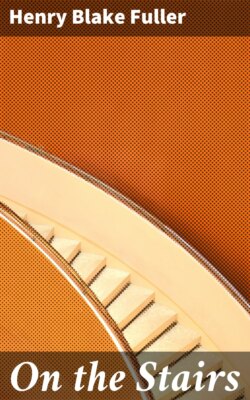Читать книгу On the Stairs - Henry Blake Fuller - Страница 12
На сайте Литреса книга снята с продажи.
I
ОглавлениеTable of Contents
Raymond went into the bank; not in due course, but rather more than a year later. After seeing some of his more advanced schoolfellows depart for Eastern colleges, after indulging a year of desultory study at home, and after passing a summer and autumn among the Wisconsin lakes, he was formally claimed by Finance. There was no Franciscan ardor to clasp her close, as others have clasped Poverty and Obedience. He began his business career, as men have been recommended to begin their matrimonial career, with a slight aversion. However, his aversion never brought him any future good.
His year at home, so far as I could make out, was taken up largely with æsthetics and music. He read the "Seven Lamps of Architecture" and they lighted him along a road that led far, far from the constructional practicalities of the yard where we had spent a Saturday forenoon, some five years before. He had begun to collect books on the brickwork of Piacenza and Cremona, and these too led him farther along the general path of æstheticism. During our years at the Academy the town, after an unprecedentedly thorough sweep by fire, had been rebuilding itself; and on more than one Saturday forenoon of that period we had tramped together through the devastated district, rejoicing in the restorative activities on every hand and honestly admiring the fantasies and ingenuities of the "architects" of the day. But Raymond had now emerged from that innocent stage; summoning forth from some interior reservoir of taste an inspirational code of his own, he condemned these crudities and aberrations as severely as they probably deserved, and cultivated a confident belief that somewhere or other he was to find things which should square better with his likings and should respond more kindly to his mounting sensibilities.
"Not going to cut us?" I once asked. "Just as we're picking up, too?"
But Raymond looked abstractedly into the distance and undertook no definite reply. Possibly he had responded to Ruskin; more probably to some divine young sense of truth and fitness such as forms the natural endowment, by no means uncommon, of right-minded youth. Or it may be that he had simply reached the "critical" age, when Idealism calls the Daily Practicalities to its bar and delivers its harsh, imperious judgments; when it puts the world, if but for a few brief months, "where it belongs." His natural tendency toward generalization helped him here—helped, perhaps, too much. He passed judgment not only on his parents, whom he had been finding very unsatisfactory, and on most of his associates (myself, for example, whenever I happened to speak an appreciative word for his essentially admirable father), but on the community as such. A filmy visitant from Elsewhere had grazed his forehead and whispered in his ear that the town allotted to him by destiny was crude, alike in its deficiencies and in its affirmations, and that complete satisfaction for him lay altogether in another and riper quarter.
Perhaps it was some such discontent as this that led him in the direction of musical composition—or toward attempts at it. He had no adequate preparation for it, nor, so far as I could perceive, any justificatory call. He had once taken a few terms on the piano; and he had on his shelves a few elementary works on harmony; and he had in his fingertips a certain limited knack for improvisation; and he had once sketched out, rather haltingly, a few simple songs. Yet, all the same, another reservoir, one of uncertain depth and capacity, was opening up for him at an age when opening-up was the continuing and dominating feature of one's days—a muse was stirring the vibrant air about him; and I gathered, after two or three certain visits to his house, that he had embarked on some composition or other of an ambitious and comprehensive nature: a cantata, possibly, or even some higher flight. As he had never domesticated musical theory and musical notation in his brain, most of his composing had to be carried on at the keyboard itself. The big piano in the big open drawing-room resounded with his strumming experiments in melody and harmony—sounds intelligible, often enough, to no ears but his own, and not always agreeable to them. I am sure he tried his parents' patience cruelly. His reiterated phrases and harmonizings were audible throughout a good part of the house. They did nothing toward relieving his mother's headaches, nothing toward raising his father's hopes that, pretty soon, he would come to grips with the elements of Loans and Discounts. Even the servants, setting the table, now and again closed the dining-room door.
"Oh, Raymond, Raymond; not to-day!" his mother would sometimes plead.
I presume that, during this period, the diary was still going on; and no one with such a gift for writing will stop short at a diary. In fact, Raymond tried his hand at a few short stories—still another muse was fluttering about his temples. Most of these stories came back; but a few of them got printed obscurely in mangled form, and the failure of the venturesome periodicals sometimes deprived him of the honorarium (as pay was then pompously called) which would have given the last convincing touch to his claims on authorship. He spoke of these stories freely enough to me, but disclaimed all attempts at poetry: short of that field, I believe, he really did stay his hand.
Well, perhaps too many good fairies—good only to the pitch of velleity—buzzed and brushed, like muses, or pseudo-muses, about his brows. All this unsettled him—and sometimes annoyed his daily associates. But how, without these instinctive young passes at Art, could the unceasing, glamorous and needful rebirth of the world get itself accomplished?
